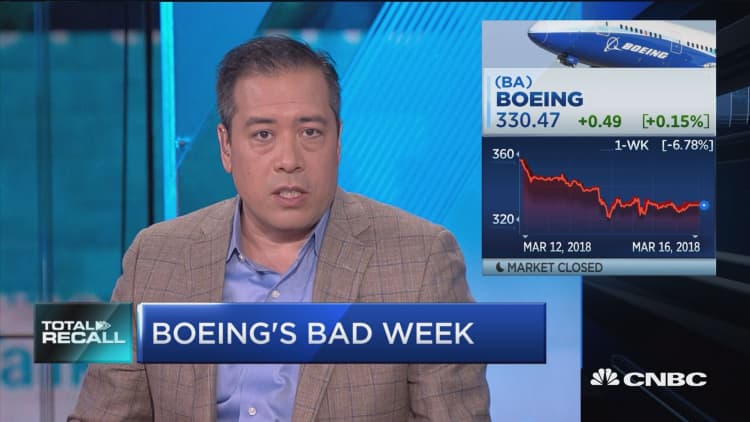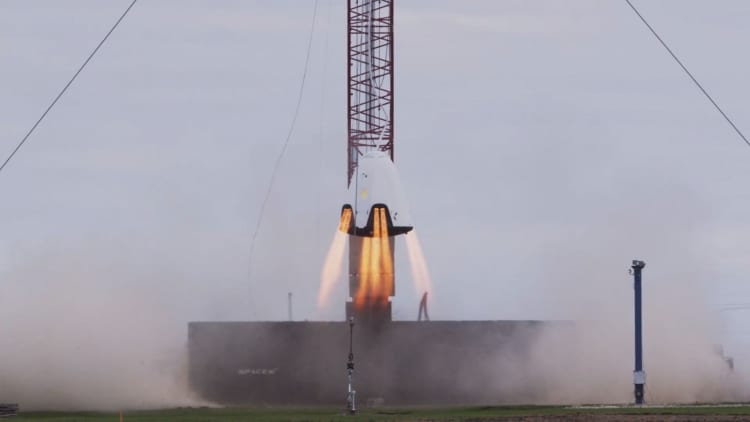Boeing's venture capital arm invested outside the U.S. for the first time when it contributed to the latest funding round for Australian satellite company Myriota, the start-up announced Monday.
The $15 million round was led by Australian venture capital firms Blue Sky and Main Sequence, with Boeing HorizonX Ventures, Singapore-based Singtel Innov8 and Right Click Capital joining the fundraising.
Myriota is developing small low-cost, low-power transmitters that connect directly to satellites in orbit. The technology is described in a statement by Boeing HorizonX Vice President Steve Nordlund as a "solution that simultaneously connects hundreds of millions" of devices to satellites.
The company has its roots in a $12 million University of South Australia project begun in 2011, known as the Australian Space Research Program.
"We identified a gap in the market and that was a need for Internet of Things connectivity," David Haley, Myriota's chief technology officer, told CNBC.
Myriota was then founded in 2015 — its team of 11 including key inventors from that research project — and the start-up expects to add at least another 20 staff in the next two years. Early discussions with Boeing's VC arm and Signtel Innov8 began last year. Haley said "it was immediately apparent" that "they got it."
"Myriota's technology influences how we think about space-based communications and connectivity in remote locations," Nordlund said.
The start-up launched a first iteration of the technology aboard a maritime-tracking nanosatellite from Canadian ExactEarth, which also led Myriota's seed funding round in 2015. Haley said that allowed for "a number of experiments to stress test the technology," from which Myriota concluded its technology would be capable of supporting hundreds of millions of devices.
"The key benefit to our technology is that it works direct to orbit," Haley said. "We don't require an aggregator, like a base station, to collect the data and connect all these devices."
Early results from Myriota's testing with agricultural applications have shown strong potential. According to Haley, Australian farmers used the technology to monitor the levels of water tanks or even track individual cattle.
"The response has been amazing," Haley said. "If something goes wrong on the farm, or something's failed with a pump, the farmers have been alerted quickly – rather than waiting until the next time they visited the equipment. It's a simple application that's saving them so much pain."

Myriota is now developing its own low Earth orbit constellation of 50 nanosatellites, each around the size of a shoebox, weighing less than 10 kilograms. The start-up's first satellite was set to launch as a rideshare aboard a SpaceX Falcon 9 rocket in February but the launch was delayed. Now the company's satellite will not launch until "this middle of this year," Haley said. Three February SpaceX launches were postponed to no earlier than April, but Haley did not specify if Myriota would participate in one of those launches or even with another launch provider entirely.
Regulatory approval for the launch of tiny satellites like Myriota's is also the subject of debate. U.S. satellite manufacturer Swarm Technologies is under scrutiny by the Federal Communications Commission (FCC) for the unauthorized launch of four prototype satellites in January.
Myriota is working with local Australian regulatory agencies for approval of its technology on the ground, while "the launcher is working our behalf" to get approval for the satellite, Haley said. He declined to clarify further, saying the company is keeping the launch authorization confidential.
Myriota's satellite constellation is key to its claim on the Internet of Things market, with the start-up citing a recent report from Machina Research estimating the sector will grow from $750 billion in 2015 to $3 trillion by 2025. Haley said Myriota could also "explore partnerships" with others deploying low Earth orbit constellations, such as the thousands of satellites being built by SpaceX and OneWeb.
"It depends on the orbits" of those constellations, Haley said, before adding that Myriota "sees opportunities there."
WATCH: SpaceX & Boeing go head-to-head in the space race



